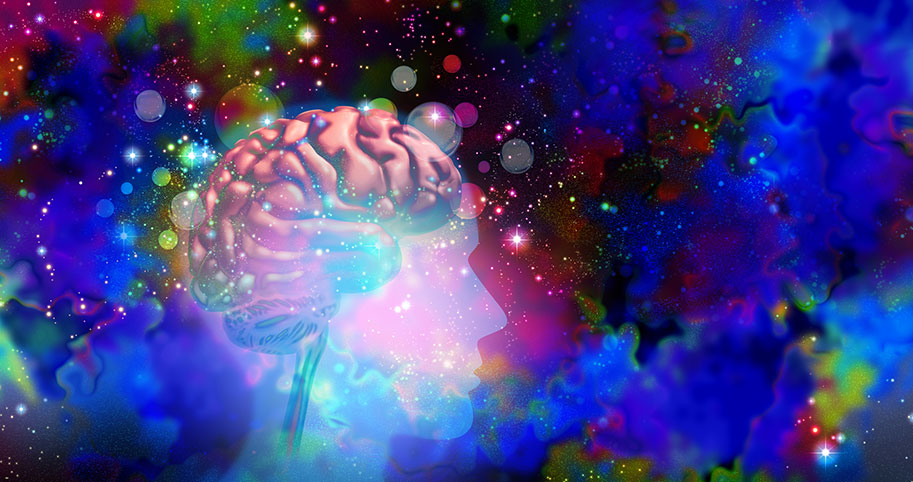
Psilocybin, a psychoactive compound found in magic mushrooms, is a naturally occurring psychedelic historically consumed for hallucinogenic effects. More recently, researchers and reformers have been uncovering medically beneficial effects. Psilocybin use has been nationally illegal under the federal Controlled Substances Act (CSA), having no accepted medical use, little accepted safety, and a high potential for abuse. Yet studies find that psilocybin can induce positive psychological experiences effective in treating depression, anxiety, and substance use disorders, while enhancing the well-being of healthy individuals.
Over the last few years many cities and states have decriminalized psilocybin either through ballot initiative or city council vote. Denver led the way by decriminalizing psilocybin for medical use in May 2019, followed by Oregon in November 2020 and all of Colorado in November 2022. A recent study by Walton College assistant professor of marketing Ashutosh Bhave, titled “Magic of the Mushrooms: Effects of Psilocybin Decriminalization,” analyzes the impact of psilocybin reforms on nationwide public interest in the psychedelic substance. The study also explores whether these reforms have influenced public interest in LSD and MDMA, two popular, more potent synthetic psychedelics
How Reform Shaped Public Interest
Bhave finds that nationwide interest in LSD and MDMA was significantly higher prior to psilocybin’s decriminalization in Denver in 2019. After Denver decriminalized psilocybin in 2019, there was a massive surge in nationwide interest in psilocybin, accompanied by a small decline in interest in LSD and MDMA.
Another spike in interest in psilocybin coincided with reforms in Oregon. Following Oregon's reforms, nationwide interest in LSD and MDMA declined sharply, and by the end of 2022, psilocybin had become the most popular psychedelic of the three. The decrease in LSD- and MDMA-related searches was less pronounced in states that have legalized recreational marijuana.
Why the Growing Interest in Psilocybin over LSD and MDMA Matters
MDMA and LSD are synthetic psychedelics which could potentially be used for treating different mental health conditions. Their use, however, is not risk free.
While MDMA has had a degree of success in treating severe PTSD, it can cause Hallucinogen-Persisting Perception Disorder (HPPD), impaired judgment, rapid heart rate, loss of consciousness, brain cell and serotonin center damage, depression, liver damage, and sometimes lethal overdoses. For instance, 23% of all drug overdose deaths in 2019 involved psychostimulants like MDMA. Similarly, LSD has shown potential to alleviate psychiatric symptoms and treat anxiety, depression, stress-related disorders, and addiction. However, most related research is over 50 years old and lacks current relevance. Additionally, LSD poses a high risk of overdose, particularly for novice users.
Compared to LSD and MDMA, psilocybin has a significantly lower rate of problematic use and a reduced risk of drug dependency. Medical emergencies involving psilocybin occur at least five times less frequently than those related to LSD and MDMA. Psilocybin use also has substantial medical benefits. It can effectively treat anxiety and depression, particularly in treatment-resistant patients or those with advanced cancer. Recent research shows that high doses of psilocybin have similar effects on depression symptoms as Escitalopram, a popular antidepressant drug. Psilocybin may also be effective for managing various psychiatric conditions, including obsessive-compulsive disorder, alcohol use disorder and substance use disorders.
Overall, psilocybin is proving to be the least harmful psychedelic alternative for therapeutic and medical treatments, and more states are adopting and implementing this knowledge. For instance, in early 2024, the Missouri Senate introduced Bill 768, which would protect specific individuals who acquire, use, produce, possess, transfer, or administer psilocybin from state or local penalties. Missourians would however have to abide by certain regulations, like being at least 21 years of age, suffering from a specific condition, and seeking enrollment in a clinical trial for psilocybin treatment. Lawmakers in other states, including Florida and Connecticut, have also proposed laws that would legalize psilocybin for diagnosable mental health conditions.
A Path Forward with Psilocybin
As more states consider easing restrictions on psilocybin, Bhave’s study presents compelling evidence of a notable rise in public interest in this psychedelic. This shift has drawn attention away from more common and riskier psychedelics like LSD and MDMA. If this trend results in reduced usage of those higher-risk substances, it could potentially lower emergency medical admissions and overdoses, carrying significant public health benefits. Loosening restrictions on psilocybin is likely to lead to increased consumption, and while recreational sales of psilocybin have not yet begun, the possibility is on the horizon, much like the path marijuana took.
It will be crucial to inform users about potential risks through warning labels, public guidance, and responsible content on social media. Though a shift away from more dangerous psychedelics is positive, the rising interest in psilocybin warrants cautious oversight. Anticipating increased nonmedical use, organized efforts are necessary to ensure user safety and manage potential side effects effectively.
From a business perspective, psilocybin could potentially reach dispensary shelves for recreational sale soon. Firms can emphasize psilocybin’s therapeutic potential, highlighting its safety and efficacy relative to other psychedelics. This presents a promising opportunity for companies to develop psilocybin-based products and services. As industry develops, firms might lobby for policy changes and support scientific research to validate psilocybin’s medical benefits, partnering with mental health organizations, research institutions, and public figures to build legitimacy. Oregon’s legalization of supervised psilocybin therapy programs has set a precedent, paving the way for innovative mental health treatments and wellness services. Wellness businesses, in particular, could integrate psilocybin into therapeutic practices, offering guided therapy sessions, retreats, and post-experience support.
In conclusion, as psilocybin reforms expand, there is a vital opportunity to promote public health, foster safe usage, and explore therapeutic and business avenues responsibly, ensuring psilocybin’s growth is grounded in evidence-based practices and public education.
 Alyssa Riley is a second-year graduate student earning her master’s degree in News
Narrative Journalism. Attending the University of Arkansas as an undergraduate student,
she earned her bachelor’s degree in News Editorial Journalism while working in numerous
writing, editing and social media roles. In addition to writing for Walton Insights,
she has begun a sports media internship with Hogs Plus Content Network and freelances
for Celebrate! Arkansas Magazine. After earning her master's, Alyssa hopes to work
in the magazine industry, specifically covering arts and culture, entertainment and
lifestyle genres.
Alyssa Riley is a second-year graduate student earning her master’s degree in News
Narrative Journalism. Attending the University of Arkansas as an undergraduate student,
she earned her bachelor’s degree in News Editorial Journalism while working in numerous
writing, editing and social media roles. In addition to writing for Walton Insights,
she has begun a sports media internship with Hogs Plus Content Network and freelances
for Celebrate! Arkansas Magazine. After earning her master's, Alyssa hopes to work
in the magazine industry, specifically covering arts and culture, entertainment and
lifestyle genres.




